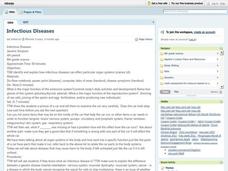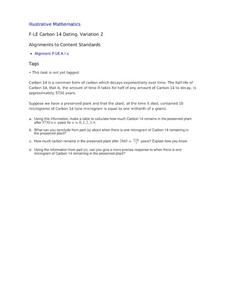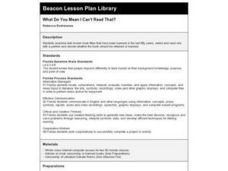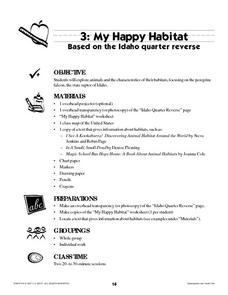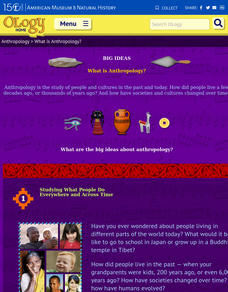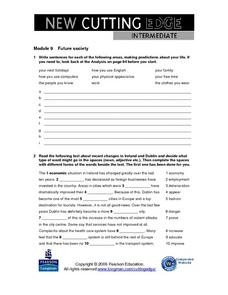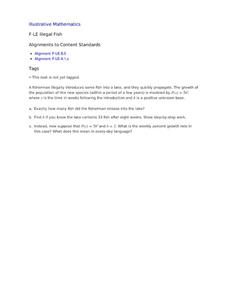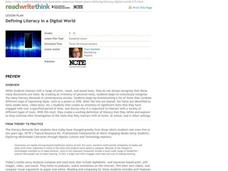Curated OER
Infectious Diseases
Eighth graders identify and explain how infectious diseases effect organ systems. Using an analogy with automobiles and body systems, they discover how one part influences the operation of the whole. Students write paragraphs about...
Curated OER
Carbon 14 Dating, Variation 2
Your archaeologists begin this task with a table of values to estimate the time passed based on the half-life of Carbon 14 remaining in a plant. They then move on to find when a specific amount of Carbon 14 is present in the same plant,...
Curated OER
Algebra: Introduction to Algebraic Expressions
Seventh graders, in an introductory algebra class, code and decode messages using substitution ciphers. Role-playing as mathematicians, they work in groups to decipher several messages, one of which translates to "math is awesome."
Curated OER
What Do You Mean I Can't Read That?
Fourth graders discuss censorship/banned books. They select and read one banned book. They conduct research to find the pro and con positions on the book. They present the book to the class.
Curated OER
My Happy Habitat
Students observe and discuss the Idaho state quarter to begin an activity in which they define and draw different types of habitats. They discuss the habitats that the migrating Peregrine falcon, which appears on the Idaho quarter,...
Curated OER
What Goes Up Must Come Down!!
Fifth graders look at actual sunrise and sunset times for their hometown to determine a pattern in the amount of daylight. They collect their data in Excel and create a chart to help them identify the pattern, then write an explanation...
Curated OER
Six Circles
Young scholars develop the skills of problem solving through looking at situations mathematically. The lesson introduces students to the concepts of theorems and proofs as part of how one looks at mathematical problems.
Curated OER
Geometry Review Quiz
Students conduct a review that is done right before having a geometry quiz. They cover major topics that are part of the assessment. They use review cards as notes to pass to one another to reinforce the concepts before putting them away...
Illustrative Mathematics
Counting Overview
Develop automatic, meaningful counting skills with your class by using everyday classroom/school items, objects, and opportunities. Counting skills should be practiced during the year using objects and items they are familiar with and...
EngageNY
Estimating Quantities
Apply the concept of magnitude to estimate values and compare numbers. The ninth lesson of the 15-part series asks learners to write numbers to their next greatest power of 10 and then make comparisons. Scholars begin to understand the...
Curriculum Corner
“I Can” Common Core! 1st Grade Math
Any first grader can master the Common Core math standards with this checklist! With each standard rewritten as an affirmative I can statement, children are provide with clear goals to work toward throughout the school year.
Display an...
American Museum of Natural History
What is Anthropology
A colorful resource introduces learners to the four major fields of anthropology: cultural anthropology, linguistic anthropology, biological anthropology, and archaeology. Explanations are provided for what each field studies, the kinds...
Curated OER
Module 9--Future Society
In this making predictions worksheet, students write nine sentences about various areas making predictions about their lives. Students read a text about recent changes in Ireland and Dublin and decide what type of word might fit...
Curated OER
Illegal Fish
Your young fishermen learn about exponential function growth by interpreting the pieces of the given equation within the context of numbers of fish in a lake.
Inside Mathematics
Snakes
Get a line on the snakes. The assessment task requires the class to determine the species of unknown snakes based upon collected data. Individuals analyze two scatter plots and determine the most likely species for five additional data...
University of Colorado
Space Travel Guide
Neptune takes 164.8 Earth years to travel around the sun. In the fifth of 22 lessons, young scientists create a travel guide to a planet in our solar system. They provide tips for others on what to bring, what they see, and their...
University of Colorado
Are All Asteroids' Surfaces the Same Age?
Did you know scientists can tell the age of an asteroid by looking closely at its craters? This final lesson of a six-part series focuses on two asteroids, Gaspra and Ida, in order to demonstrate the concept of dating asteroids. Scholars...
Curated OER
Mississippi Trial, 1955: Concept Analysis
Considering Christopher Crowe's Mississippi Trial, 1955 with reading groups or as a whole-class text? Check out the background information and instructional ideas in this seven-page resource packet.
Novelinks
The Graveyard Book: Concept Analysis
Neil Gaiman's award winning children's fantasy novel, The Graveyard Book, is the focus of a literary analysis overview. Those new to the novel can decide whether the book is appropriate for whole-class discussion or as a book circle...
Montgomery Public Schools
Romeo and Juliet Study Packet
William Shakespeare's Romeo and Juliet, a play about star-crossed lovers, resonates deeply with teenagers. The study packet contains study questions for each act of the play. Learners use a graphic organizer to analyze whether characters...
Stanford University
Annexation of Hawaii
Once an independent nation, Hawaii became part of the United States only after a business-sponsored coup of its queen. After examining newspapers from the 1890s, learners consider whether native Hawaiians wished to become Americans at...
US Department of Agriculture
Agriculture Counts
Agricultural survey and the documentation of livestock or goods was the basis for the first written language. Youngsters discuss sorting and counting, and how these skills have been used for thousands of years. They accent their class...
Curated OER
Hatchet: Concept Analysis
Take an in-depth look into Gary Paulsen's Hatchet with a concept guide. With a list and explanation of thematic motifs, types of conflicts, and vocabulary in the novel, learners will engage with the text in a whole new way.
ReadWriteThink
Defining Literacy in a Digital World
What skills are necessary to interact with different types of text? Twenty-first century learners live in a digital world and must develop a whole new set of skills to develop media literacy. Class members engage in a series of...


